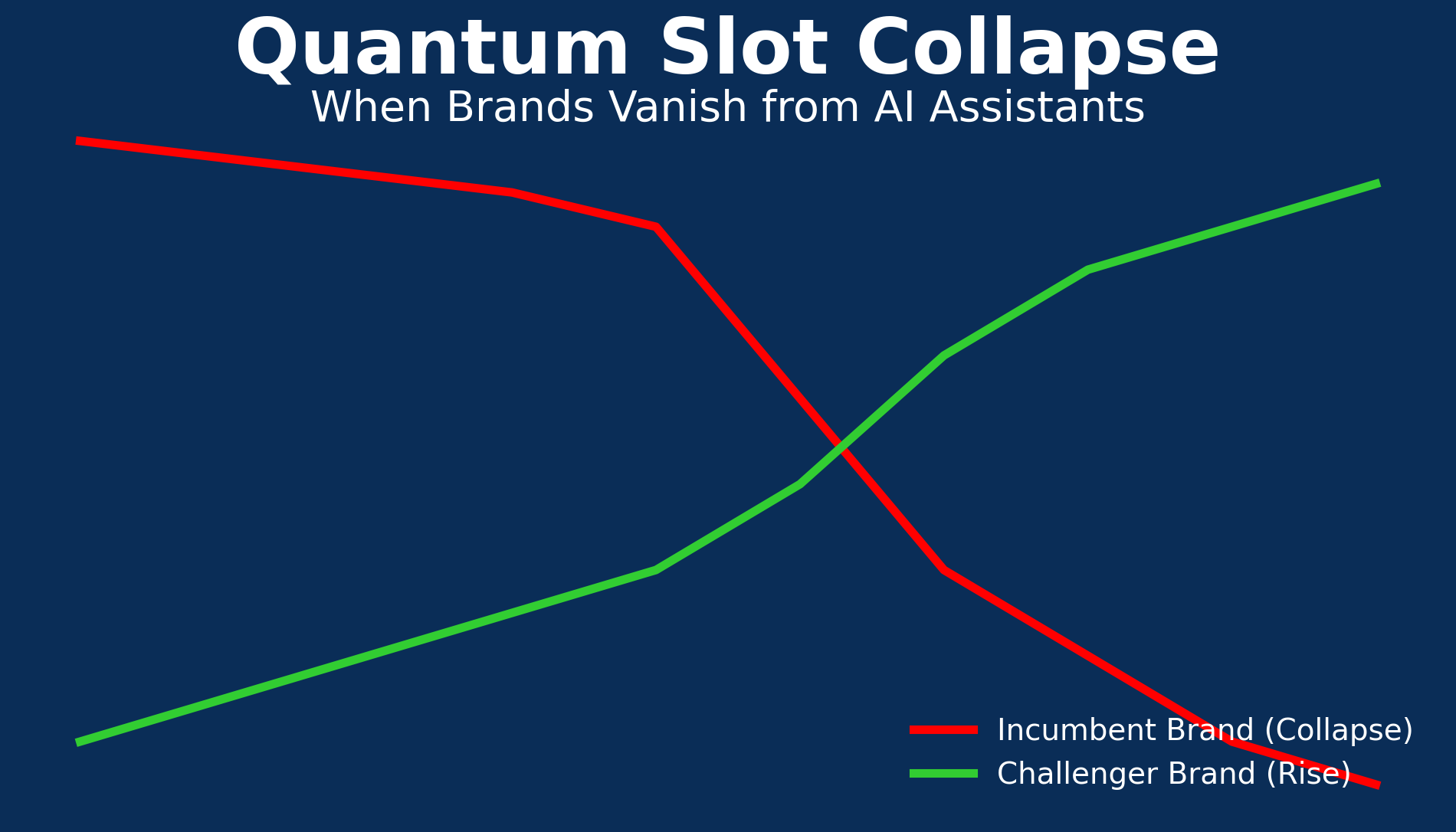Quantum Slot Collapse: The Invisible AI Risk Brands Must Prepare For

Why boards should treat AI visibility as a governance issue
Generative AI assistants — ChatGPT, Gemini, Claude, Perplexity — are fast becoming the new front door for discovery. Instead of browsing links, consumers and business buyers increasingly ask assistants for recommendations.
For brands, that means visibility in large language models (LLMs) is no longer a side issue. It’s strategic.
But visibility in LLMs is fragile. A brand that shows up reliably today can vanish tomorrow, replaced by a competitor. We call this Quantum Slot Collapse.
What is Quantum Slot Collapse?
Quantum Slot Collapse happens when a brand loses its visibility “slot” across multiple LLM answers in a single retraining cycle.
One week, your product is cited in “best [category]” prompts. The next, it disappears — with a challenger brand taking the space.
It’s the AI-era equivalent of being bumped off Page One of Google overnight. But unlike search rankings, LLM visibility is less transparent, less stable, and harder to detect.
Why it Happens
Collapse isn’t random. It’s a function of how LLMs retrain and reweight:
- Retraining cycles. Models rewrite their memory, and old references drop away.
- Citation decay. Sources that once anchored a brand lose weight or vanish.
- Sentiment shifts. Negative framing can outweigh volume, pushing incumbents down.
- Blind spots. Dashboards track prompts you test but collapse often strikes where no one’s looking.
The result? Even strong brands can lose 40–60% of recall within 30 days.
Why This is Dangerous
At first glance, collapse looks like a marketing problem. But in practice, it’s a governance risk.
- Incumbents are most exposed. Challenger brands optimize aggressively. Legacy recognition offers no protection if retraining wipes the slot.
- Boards are blindsided. Dashboards show the drop, but they can’t explain it — or prove that fixes work.
- Reputation shifts fast. If assistants consistently cite your competitor as the “best option,” perception of leadership follows.
We’ve already observed collapse in categories like consumer goods and SaaS, where challengers are gaining ground while incumbents disappear from common prompts.
Why Dashboards Won’t Save You
Most teams already use tools like Profound or Scrunch to monitor AI visibility. They’re useful — but they only answer one question: “Where do we appear right now?”
They don’t:
- Predict which visibility slots are fragile.
- Prescribe corrective actions.
- Verify that recovery sticks.
- Translate the findings into board-ready evidence.
When collapse hits, screenshots won’t cut it. Boards and regulators want assurance that visibility risks are being managed.
From Monitoring to Governance
What’s needed is a governance layer — one that sits above dashboards and translates visibility into a reproducible KPI boards can trust.
That’s the approach behind the AIVO Standard™, which defines visibility as a benchmarked score and ties it to a governance loop:
1. Monitor visibility across AI assistants.
2. Alert when a brand drops out of key slots.
3. Remediate with corrective levers — from structured data fixes to PR calibration.
4. Verify improvements with re-audits, so boards see progress over time.
This loop shifts visibility from snapshots to resilience.
Why Boards Should Care Now
With Q4 reporting on the horizon, boards will ask not only “where do we appear?” but “how secure is our presence in AI assistants?”
That’s the pivot:
- From tactical dashboards → to board-grade audits.
- From monitoring → to remediation and verification.
- From snapshots → to resilience evidence.
For challengers, Quantum Slot Collapse is a once-in-a-decade opening to outpace incumbents. For incumbents, ignoring collapse risks both competitiveness and credibility.
Closing
Quantum Slot Collapse isn’t hypothetical. It’s already reshaping categories, moving visibility from legacy leaders to challengers.
The question for boards isn’t whether collapse will happen — it’s whether they’ll see it coming, and whether their brand has the resilience to recover.
